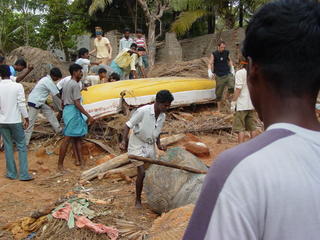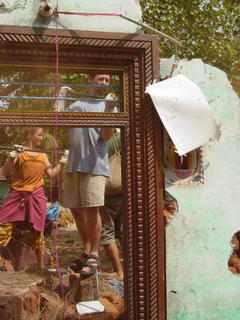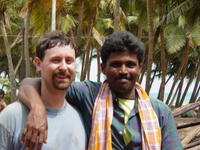What is happening in New Orleans right now is astounding - days after Hurricane Katrina, the city has become a lake, people are starving and ill and turning violent or desperate. This is something that we haven't seen in the US, and therefore something for which we are totally unprepared.
What we are witnessing is not beyond human imagination, however. Jose Saramago wrote a brilliant novel, captivating in its darkness, about what might happen when a catastrophe of these dimensions befalls a city. Read
Blindness and you will feel much more a part of life in New Orleans today.
The Confederacy of Dunces, by which I mean both the media and the government, is nevertheless completely shocked by the things that are taking place. Why? If we are witnessing human behavior that has already been written about in excruciating, exquisite detail by a Nobel laureate, why aren't we just a little more prepared for such things happening in a real-life disaster?
The answer lies with the script. By now we know what a hurricane, or an earthquake, or a tornado, or any other natural disaster is "supposed" to look like. For a hurricane, we get a few days of stories speculating about the track the storm is going to take into the United States, and maybe a few stories showing the bad things that happened to some brown people as the monster wiped out their island. Then we get some exciting coverage of the storm moving in - lots of wind and rain, and the reporter clutching his hat while palm trees bend toward the road. The storm moves north, and the camera crews move in to the beachfront town. We get pictures of roofs lifted away, crumpled houses, boats that have landed inside restaurants. Some interviews with the distraught survivors. Maybe some funerals, which can stretch the coverage out for a few more days. And then we're on to the next story.
The problem with New Orleans was that Katrina didn't dance to the right music in the Big Easy. We weren't ready (except for the scientists and engineers who have been predicting this for years) for the rules to be broken, for the script to be tossed aside. After the hurricane, the water is supposed to go away, damn it! The part where a lake empties into a city that has been built below sea level just doesn't fit our expectations.
The government "leaders" had, of course, followed the same script. Why the hell wasn't the president in the situation room when all hell was breaking loose on the Gulf Coast? Why was he playing pretend guitar in Los Angeles? He wasn't in the situation room because nobody in the White House thought that we were facing a "situation." When we think of leadership, we think of Tommy Lee Jones in "The Fugitive":
Alright, listen up, people. Our fugitive has been on the run for ninety minutes. Average foot speed over uneven ground barring injuries is 4 miles-per-hour. That gives us a radius of six miles. What I want from each and every one of you is a hard-target search of every gas station, residence, warehouse, farmhouse, henhouse, outhouse and doghouse in that area. Checkpoints go up at fifteen miles. Your fugitive's name is Dr. Richard Kimble. Go get him.
Had the president been sitting in the White House making phone calls, gathering information, and giving orders, we would have seen every Greyhound bus, school bus, city bus, and minivan from a 500 mile radius driving to New Orleans 2 days before the storm, picking up the 35% of the city's population who didn't have their own transport, and getting them to a place of safety. We would have seen food and water pre-positioned in the places where people assembled. We would have seen all available emergency personnel from every state in the union on standby to go save lives the minute the winds dropped enough for them to safely enter the affected areas.
Instead, we saw the president leisurely deciding it might be a good idea to wrap up his vacation and fly slowly over the devastation zone, showing all the grace of Vladimir Putin at his dacha while the Kursk sank to the bottom of the Arctic Ocean and slowly suffocated more than 100 sailors. After all, his script said that everything would be all right in a day or two. Condi Rice was in New York shopping for thousand dollar shoes two days later - she had read the same script, and figured the cleanup would be already underway.
The reasons why the residents of New Orleans didn't have the good sense to get out of their city also have much to do with the script. Many residents couldn't get out because they didn't have private transport and lacked where to go. Others were stuck, in nursing homes or wherever. But a good many (probably a minority of those left behind) had probably seen the coverage of other hurricanes and knew that, according to the script, they would have some wild and wooly tales to tell and would then be the first to pick up the pieces and get on with their lives. How many Hollywood tales have you seen where you know the basic outlines of the movie after the first ten minutes of watching the plot get set up? Fault those people if you choose, but it is the media and the government leaders who really should have had the greater perspective to understand that the script would not necessarily apply. Alternate endings were not only possible but likely, and for those the people in command of public protection should have been in greater command of the realities faced by New Orleans and surrounding areas.
One other thing. We also all know the script when it comes to earthquake coverage. After the unpredicated initial event, after the shock of seeing buildings crumple and bodies crushed, we know that we have about 10 days during which rescue crews arrive from around the globe, put their stethoscopes to piles of rubble, and pull out "miracle" survivors who had managed to stay alive 4, 5, 8, or even 10 days after the catastrophe. Such stories should also be coming out of New Orleans right now. At this moment, 5 days after the storm hit, there are probably still people who are alive and trapped in their attics, people who will not be alive tomorrow. If they are alive tomorrow, they will not be alive the day after, or the day after, or whenever it is that help finally makes it to them. There are also people who are dead today - TODAY - who were alive yesterday, or the day before. If rescue personnel could have gotten in yesterday, these people might have lived. If the levee breach could have been fixed sooner, and pumping could have started sooner, some of the people who are dying NOW would instead live to tell the tale. We weren't watching the Earthquake script, though, where rescuers arrive en masse and save the survivors. We were following the Hurricane script, where you either die during the storm or you make it out alive. It will come as little consolation to the thousands of Americans who have lost family members - or whose loved ones will die in the next few days - that their suffering was caused in part because the media was broadcasting on, and the leaders were watching, the wrong channel.






